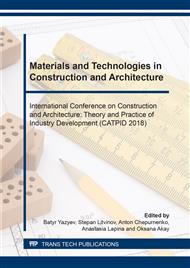p.461
p.469
p.475
p.481
p.489
p.496
p.502
p.508
p.515
Heat-Resistant Cement Composites Using Volcanic Pumps and Vermiculite
Abstract:
The results of research on the development of heat-resistant cement composites using volcanic pumice and expanded vermiculite are presented. Compositions of heat-resistant cement composites are proposed that significantly reduce Portland cement consumption and simultaneously improve their heat-resistant properties. The use of basalt fibers in composites makes it possible to increase their strength, crack resistance and heat-resistant properties due to the perception of tensile temperature stresses. Part of the expensive vermiculite can be replaced by pumice without significantly increasing the average density of the composite, while their strength characteristics increase.
Info:
Periodical:
Pages:
489-495
DOI:
Citation:
Online since:
September 2018
Keywords:
Price:
Сopyright:
© 2018 Trans Tech Publications Ltd. All Rights Reserved
Share:
Citation:


